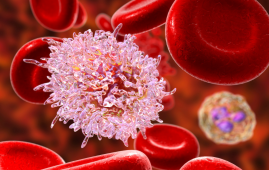

March is Colorectal Cancer Awareness Month. The campaign is intended to educate the public about risk factors of the disease — the third leading cause of cancer death in the United States — and the importance of screening.
In conjunction with this observance, we provide the following updates related to colorectal cancer treatment and detection that may be relevant to your practice.
- A three-drug combination demonstrated activity for patients with microsatellite-stable, BRAF V600E-positive metastatic colorectal cancer. The regimen — which consisted of encorafenib (Braftovi, Pfizer), cetuximab (Erbitux, Eli Lilly) and nivolumab (Opdivo, Bristol Myers Squibb) — also appeared well-tolerated.
- The combination of cabozantinib (Cabometyx, Exelixis) and durvalumab (Imfinzi, AstraZeneca) appeared safe and demonstrated efficacy among a small cohort of patients with advanced mismatch repair-proficient/microsatellite-stable colorectal cancer.
- The FDA approved cetuximab (Erbitux, Eli Lilly) in combination with encorafenib (Braftovi, Pfizer) for treatment of certain patients with colorectal cancer. The indication applies to use of the agents by adults with BRAF V600E mutation-positive metastatic disease detected by an FDA-approved test who received prior therapy.
- First-line nivolumab (Opdivo, Bristol Myers Squibb) plus standard of care chemotherapy failed to prolong 1-year PFS among patients with metastatic cancer.
- Sotorasib (Lumakras, Amgen) demonstrated antitumor activity among patients with heavily pretreated advanced KRAS G12C-mutated cancer.
- Younger and older patients with metastatic colorectal cancer had similar survival outcomes despite differences in fitness levels and treatment intensity.
- Robotic-assisted surgery significantly improved outcomes compared with laparoscopic surgery among patients with middle and low rectal cancer.
- Individuals aged between 20 and 39 years had the greatest burden of distant early-onset colorectal adenocarcinoma.
- Consumption of unprocessed red or processed meat did not impact risk for colon cancer recurrence or mortality.
- Weight loss during the first 3 months of systemic therapy for metastatic cancer coincided with significantly shorter OS compared with stable or increasing weight.
more recommended stories
 High-Intensity Training and Oxidative Stress Insights
High-Intensity Training and Oxidative Stress InsightsNew Evidence Linking High-Intensity Training and.
 Perinatal Mental Health Challenges Highlighted in New Study
Perinatal Mental Health Challenges Highlighted in New StudyMental Health Challenges in New Parents:.
 Safer Allogeneic Stem Cell Transplants with Treg Therapy
Safer Allogeneic Stem Cell Transplants with Treg TherapyA new preclinical study from the.
 World Summit Outlines Core Principles for Healthy Longevity
World Summit Outlines Core Principles for Healthy LongevityWhy Healthy Longevity Demands a New.
 Cholesterol-Lowering Drugs May Help Reduce PFAS Levels
Cholesterol-Lowering Drugs May Help Reduce PFAS LevelsPer- and polyfluoroalkyl substances (PFAS) continue.
 AI ECG Model Outperforms Standard STEMI Triage
AI ECG Model Outperforms Standard STEMI TriageNovel AI ECG Model Outperforms Standard.
 WHO and EU Strengthen Digital Health in Africa
WHO and EU Strengthen Digital Health in AfricaThe World Health Organization (WHO) and.
 Quitting Smoking Slows Memory Decline, Study Finds
Quitting Smoking Slows Memory Decline, Study FindsQuitting smoking is linked to slower.
 Breakfast Skipping Linked to Metabolic Syndrome
Breakfast Skipping Linked to Metabolic SyndromeBreakfast Skippers May Face Metabolic Consequences.
 Cancer Cells Learn to Self-Report: A New Frontier in Immunotherapy
Cancer Cells Learn to Self-Report: A New Frontier in ImmunotherapyHow a Drug Complex Enables Immune.

Leave a Comment